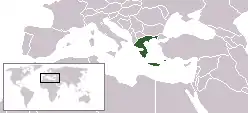ܝܘܢ
Assyrian Neo-Aramaic

ܝܘܢ

ܐܬܐ ܕܝܘܢ
Etymology 1
From Ancient Greek Ἴων (Íōn) and Ἰωνία (Iōnía); compare Hebrew יָוָן (yaván) and Arabic الْيُونَان (al-yūnān).
Pronunciation
- (standard) IPA(key): [jɑːwɑnː]
Proper noun
ܝܵܘܵܢ • (yāwān) f
- Greece (A country in southeastern Europe. Official name: Hellenic Republic)
- Acts 20:2:
- ܚܕܝܼܪܹܗ ܒܗ̇ܘ ܐܲܬܪܵܐ، ܘܝܘܼܗ݇ܒܹܠ ܠܹܗ ܠܸܒܵܐ ܠܐ݇ܢܵܫܹ̈ܐ ܒܗܹܡܸܙܡܵܢܹ̈ܐ ܪܵܒܵܐ ܘܐ݇ܬܹܐ ܠܹܗ ܠܝܵܘܵܢ.
- Now when he had gone over that region and encouraged them with many words, he came to Greece.
- Daniel 8:21:
- ܬܲܝܫܵܐ ܡܲܠܟܘܼܬܵܐ ܕܝܵܘܵܢ ܝܼܠܹܗ. ܩܲܪ݇ܢܵܐ ܓܘܼܪܬܵܐ ܕܒܹܝܠ ܥܲܝ̈ܢܘܼܗܝ، ܗ̇ܘ ܝܠܹܗ ܡܲܠܟܵܐ ܩܲܕ݇ܡܵܝܵܐ.
- tayšā malkutā d-yāwān īlēh. qanā gurtā d-bēl ʿaynuh, awa ìlēh malkā qamāyā.
- And the male goat is the kingdom of Greece. The large horn that is between its eyes is the first king.
- Acts 20:2:
Proper noun
ܝܵܘܵܢ • (yāwān) m
- (biblical) Javan, the fourth son of Japheth
- Genesis 10:2:
- ܒܢܘܿܢܹ̈ܐ ܕܝܲܦ̮ܬ: ܓܵܡܵܪ، ܘܡܵܓܘܿܓ، ܘܡܵܕܲܝ، ܘܝܵܘܵܢ، ܘܬܘܼܒܵܠ، ܘܡܵܫܵܟ، ܘܬܝܼܪܵܣ.
- bnonē d-yaft: gāmār, w-māgog, w-māday, wyāwān, w-tubāl, w-māšāk, w-tīrās.
- The sons of Japheth: Gomer, and Magog, and Madai, and Javan, and Tubal, and Meshech, and Tiras.
- Genesis 10:2:
Etymology 2
| Root |
|---|
| ܗ ܘ ܐ (h w ʾ) |
| 4 terms |
Likely from a variant form of the verb ܗܵܘܹܐ (hāwē, “to be”) forming unattested *ܝܲܗܘܹܝܢ (*yahwēn) or a corruption of ܗܵܘܹܝܢ (hāwēn), both theoretically being contractions of *ܝܲܗܘܹܐ ܐ݇ܢܵܐ (*yahwē nā) or *ܗܵܘܹܐ ܐ݇ܢܵܐ (*hāwē nā) respectively.
Pronunciation
- (standard) IPA(key): [ʔiːwɪn.]
Etymology 3
Likely from a variant form of the verb ܗܵܘܹܐ (hāwē, “to be”) forming unattested *ܝܲܗܘܵܢ (*yahwān) or a corruption of ܗܵܘܝܵܢ (hāwyān), both theoretically being contractions of *ܝܲܗܘܵܐ ܐ݇ܢܵܐ (*yahwā nā) or *ܗܵܘܝܵܐ ܐ݇ܢܵܐ (*hāwyā nā) respectively.
Pronunciation
- (standard) IPA(key): [ʔiːwɑnː]
Classical Syriac
Etymology
Ultimately from Ancient Greek Ἰωνία (Iōnía).
Pronunciation
- IPA(key): [yawɑn]
Noun
ܝܘܢ • (yawān) m
- (biblical) Javan
- Greece
- Synonyms: ܒܝܬ ܝܘܢܝ̈ܐ, ܗܠܣ
- Hellenic Republic
- Synonym: ܩܘܛܢܝܘܬܐ ܝܘܢܝܬܐ
Related terms
References
- ܝܘܢ on syriacdictionary.net
- Bar Bahlul, Ḥasan (a. 1000), Duval, Rubens, editor, Lexicon Syriacum (Collection Orientale; 15–17) (in Classical Syriac), Paris: e Reipublicæ typographæo, published 1901, page 419
- Payne Smith, Jessie (1903) A Compendious Syriac Dictionary Founded Upon the Thesaurus Syriacus of R. Payne Smith, D.D., Oxford: Clarendon Press, page 190
- Jastrow, Marcus (1903) A Dictionary of the Targumim, the Talmud Babli and Yerushalmi, and the Midrashic Literature, London, New York: Luzac & Co., G.P. Putnam's Sons, page 570
- Payne Smith, Robert (1879–1901) Thesaurus Syriacus (in Latin), Oxford: Clarendon Press
Further reading
![]() ܝܘܢ on the Aramaic Wikipedia.Wikipedia arc
ܝܘܢ on the Aramaic Wikipedia.Wikipedia arc
This article is issued from Wiktionary. The text is licensed under Creative Commons - Attribution - Sharealike. Additional terms may apply for the media files.